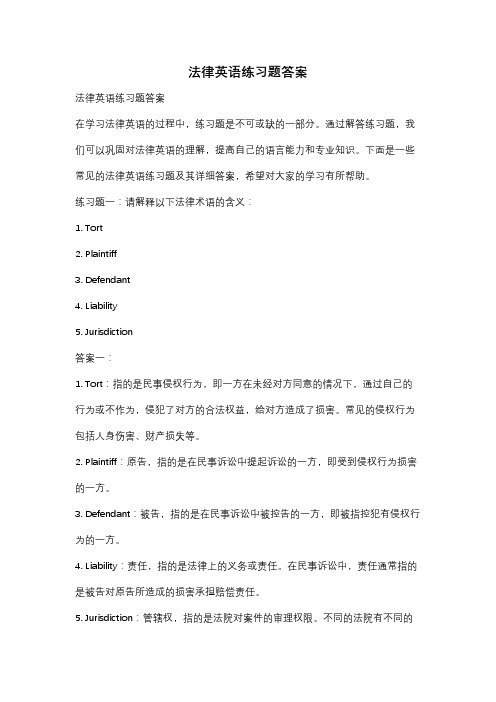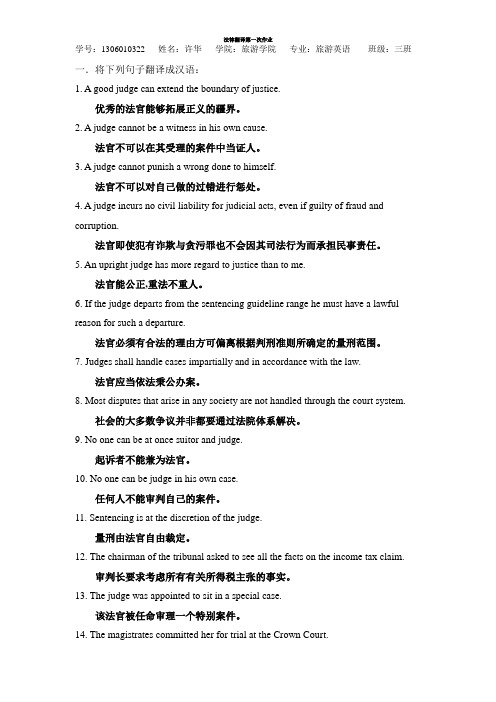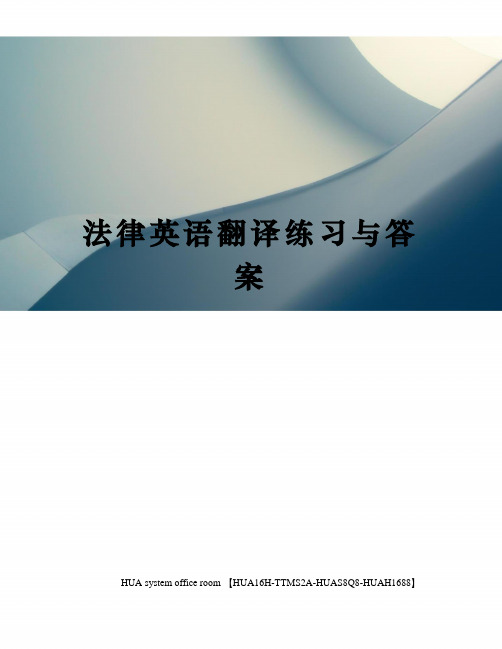法律英语作业(中文)
法律英语练习题答案

法律英语练习题答案法律英语练习题答案在学习法律英语的过程中,练习题是不可或缺的一部分。
通过解答练习题,我们可以巩固对法律英语的理解,提高自己的语言能力和专业知识。
下面是一些常见的法律英语练习题及其详细答案,希望对大家的学习有所帮助。
练习题一:请解释以下法律术语的含义:1. Tort2. Plaintiff3. Defendant4. Liability5. Jurisdiction答案一:1. Tort:指的是民事侵权行为,即一方在未经对方同意的情况下,通过自己的行为或不作为,侵犯了对方的合法权益,给对方造成了损害。
常见的侵权行为包括人身伤害、财产损失等。
2. Plaintiff:原告,指的是在民事诉讼中提起诉讼的一方,即受到侵权行为损害的一方。
3. Defendant:被告,指的是在民事诉讼中被控告的一方,即被指控犯有侵权行为的一方。
4. Liability:责任,指的是法律上的义务或责任。
在民事诉讼中,责任通常指的是被告对原告所造成的损害承担赔偿责任。
5. Jurisdiction:管辖权,指的是法院对案件的审理权限。
不同的法院有不同的管辖权,根据案件的性质、金额等因素来决定哪个法院有权审理该案件。
练习题二:请将以下英文法律名词翻译成中文:1. Contract2. Arbitration3. Injunction4. Intellectual property5. Negligence答案二:1. 合同2. 仲裁3. 禁令4. 知识产权5. 过失练习题三:请解释以下法律原则的含义:1. Presumption of innocence2. Due process3. Burden of proof4. Reasonable doubt5. Double jeopardy答案三:1. Presumption of innocence:无罪推定,指的是在刑事诉讼中,被告在未被证明有罪之前,应被认定为无罪。
法律英语作业(中文)

简析公司法规制公司的法律(在英国,就是公司法)在不同的国家会不同吗?尽管研究公司法的学者们很少提及这一问题,但是对公司法的比较研究还是非常重要的。
最近关于公司法的研究主要集中于欧洲、美国和日本等发达经济体在公司治理、股份所有权、金融资产和企业文化等方面的比较分析。
在这些方面,尽管不同的国家有各自的特征,但是各国家公司形式的根本一致还是令人印象非常深刻的。
其实,公司都具有一套基本类似的法律性质,同样,它们也面临着一套基本类似的法律问题。
就公司形式而言,就要考虑公司的根本法律属性,展望本文以下讨论,我们认为公司具有五个方面的属性,它们为大部分商务人士所知悉。
这五个方面的属性是:法人资格、有限责任、股权转让、董事会领导下的公司管理及出资者所有权。
这些属性因现代大型企业所面对的紧急需要而产生,具体原因我们将在下文中从四个方面进行说明。
总之,任何国家的公司法都必须围绕公司的这五大属性进行拟制。
事实上,有一些企业缺乏其中的某些属性,但是我们想强调的是,在市场经济条件下,所有的大型公司都采用具备五大属性的法人形式。
除此之外,绝大多数小型合伙企业也经常采用这种形式,尽管有时因为特殊需要,这些公司可能会缺失五大属性中的一种或多种。
(通过本书,我们将遵循通常所谓的“封闭公司”的概念,来讨论那些股份不能自由转让的不同于“公众公司”的公司,股份不能转让的原因要么是股份被一小部分人所持有,要么是对股东的转让权有所限制。
)很显然,公司法的首要功能是为公司提供一个具备五个核心属性的法定形式。
如果这种形式能够广泛推广,并且被广泛采纳,那么借助于其中的某些规则,比如改变背景财产权及提供备用开支等规则,公司法就能够鼓励企业家通过公司实体这一媒介进行交易,进而还可以降低交易成本。
当然,从整体看来,那些用来规制公司形式的法律条款的数量仅仅是公司法中的一小部分,然而,这些条款却构成了公司法的核心部分。
在这一章,我将探寻具有五大属性的公司的缔约效率,我们也相信这五大属性已经推动了世界范围内对这种公司形式的采用。
法律翻译.

一.将下列句子翻译成汉语:1. A good judge can extend the boundary of justice.优秀的法官能够拓展正义的疆界。
2. A judge cannot be a witness in his own cause.法官不可以在其受理的案件中当证人。
3. A judge cannot punish a wrong done to himself.法官不可以对自己做的过错进行惩处。
4. A judge incurs no civil liability for judicial acts, even if guilty of fraud and corruption.法官即使犯有诈欺与贪污罪也不会因其司法行为而承担民事责任。
5. An upright judge has more regard to justice than to me.法官能公正,重法不重人。
6. If the judge departs from the sentencing guideline range he must have a lawful reason for such a departure.法官必须有合法的理由方可偏离根据判刑准则所确定的量刑范围。
7. Judges shall handle cases impartially and in accordance with the law.法官应当依法秉公办案。
8. Most disputes that arise in any society are not handled through the court system.社会的大多数争议并非都要通过法院体系解决。
9. No one can be at once suitor and judge.起诉者不能兼为法官。
10. No one can be judge in his own case.任何人不能审判自己的案件。
13级法律英语作业

要求:作业按次数分页打印。
完成稿可打印,可手写。
提交时间:6月15日前。
第一次作业翻译教材第七课刑法练习第2 题listening compression 段落第二段。
在起诉后,被告的律师做了一个精神病的辩护,证明欣克利是在精神错乱(精神病的状态下)不能控制自己的情况下进行射击的。
在审判时,在起诉时,精神病医生证实,欣克利精神正常的,但在辩护时,精神病医生证实欣克利是处于神志不清的状况的。
通过欣克利的质疑并随着他的逮捕,FBI代理人已经掌握了一些与这个精神病辩护问题的相关的背景信息。
但是,华盛顿地区法院规则中背景信息不能被用作证据,因为这是一个欣克利申请律师之后在讯问进行的结果,是违反米兰达规则中的法律原则的。
这个法院判决被华盛顿起诉法院所证实,而且政府也没有采取进一步公诉的行动。
在评议后,审判陪审团发现,欣克利是精神有问题的精神病,换句话说,被告不应该对开枪(枪杀)负责任。
第二次作业:关于陈满无罪释放案:英译中The acquittal of 54-year-old Chen Man who spent 23 years in prison having been wrongly convicted of arson and murder became an instant hot topic minutes after his release on Monday.陈满因放火和谋杀错误定罪而被监禁23年的,54岁时无罪释放,在他星期一获释后几分钟内成为一个即时热点话题。
Chen from Sichuan province was handed a suspended death sentence in 1994 having been accused of killing a man in Haikou, capital of Hainan province, and then setting a fire to destroy evidence.陈满被控在海南省的首都海口杀了一个人而且放火烧毁证据,在1994年从四川省上交并判处死缓。
法律英语_教材汉翻英答案(完整版)

法律英语_教材汉翻英答案(完整版)《法律英语》课后“汉翻英”答案 (完整版)Lesson One1)Common law is the law developed by judges through decisions of courts and similar tribunals.2) Equity is a type of law that developed in parallel with common law since the end of the 14th century, which applies to civil cases and is one of the sources of the common-law system.3) In the U.S., one of the functions of the federal courts is to interpret federal statutes and the constitution.4) The civil-law system mainly prevails in continental Europe as well as other countries and regions heavily influenced by continental European countries.5) Before the Federal Rules of Civil Procedure was promulgated in 1938, the federal courts of the United States procedurally separated law and equity. Lesson Two1) Private law regulates the relationship between individuals whiles public law concerns the relationship between person (including natural persons and artificial persons) and the state.2) Codification is not the essential difference between the civil-law system and the common-law system.3) In many civil-law jurisdictions, precedents are not considered as binding.4) Domestic law is different from international law in that domestic law refers to the laws within a given state which regulates the acts of individuals and other legal entities within its jurisdiction.5) Substantial law refers to laws that define and recognize rights and obligations as well as duties and responsibilities whileprocedural law refers to laws that provides for the mechanism for the realization or performance of rights and duties as well as duties and responsibilities.Lesson Three1) In some countries alcoholic beverages are prohibited from being sold to children.2) Since the 1980s, China has set up and improved the employment service system, which includes employment introduction, employment training, unemployment insurance and employment services.3) Various forms of resistance to desegregation were prevailing in those years.4) It is unjust and unlawful to discriminate against people of other races.5) Just as individuals in a democratic country have equal voting rights regardless of whether they are rich or poor, powerful or weak, all countries in the General Assembly have the same voting rights.Lesson Four1) A crime is an act which may lead to the imposition of punishment.2) Some reports accused BP of criminal negligence in the oil spill in the Gulf of Mexico.3) Modern U.S. criminal law provides that there must be clear definition for all the constituting elements of each and every crime.4) Generally those who provide assistance to people in their criminal act are punishable as accessories or accomplices.5) Failure to act may be punished where the person is undera duty to act. Lesson Five1) Parties to a contract shall fully perform their obligations in accordance with the stipulations of the contract.2) A contract is an agreement between parties which creates, modifies or terminates a civil relationship. A contract established in accordance with law is protected by law.3) A citizen or a legal person shall bear civil liabilities for his failure to fulfill his contractual or other obligations.4) No modification or revocation of a contract may prejudice the parties’claims for damages.5) For a party’s non-performance or his performance unfaithful to the contractual stipulations, the other party to a contract is entitled to demand specific performance or other remedies, and also, compensation for the resulted losses.Lesson Seven1) One who is at fault for infringing upon the civil right or interest of another person shall be subject to the tort liability.2) Where a defective product causes any harm to another person, the manufacturer shall assume the tort liability.3) One who shall assume the tort liability for infringing upon the civil right or interest of another person, whether at fault or not, as provided for by law, shall be subject to the legal provisions in the tort law.4) Where a tort endangers the personal or property safety of another person, the victim of the tort may require the tortfeasor to assume the tort liability such as cessation of infringement, removal of obstruction and elimination ofdanger.5) A network user or network service provider who infringes upon the civil right or interest of another person through network shall assume the tort liability.Lesson Seventeen1) Before the judgment what is to be done is to dispose of the case, while after the judgment is rendered, all that remains to be done is to enforce it.2) If the matter involved in the appeal is of great importance, it ought to be submitted for review.3) There are exemptions from jury service for members of the legal profession, the police force, etc.4) Judges often require that the parties agree upon a schedule of issues so as to accelerate the trial process.5) In the High Court an official shorthand note is, unless the judge otherwise directs, taken of any evidence given orally in Court and of the summing up by the judge. Upon payment of the prescribed fee, a transcript can be made available.Lesson Eighteen1) The arbitration award shall be final and binding on both parties.2) The dispute shall be submitted for arbitration by a mutually nominated arbitrator.3) Where no settlement can be reached, the dispute shall be submitted for arbitration.4) Each party may also directly apply for arbitration to the Personnel Dispute Arbitration Commission.5) Traditionally, our contracts did not contain provisions for arbitration in a third country.。
法律英语作业文档

法律英语作业文档HOMEWORK《一》解释下列术语Legal system法系Legal English 法律英语Common law……………………普通法Civil law……………………………大陆法Advocate是指学习法律、依法获准执业、为当事人提供法律意见,并有资格出庭参加案件公开审理的律师,即辩护律师(英美不用);指法国等地律师、法律顾问。
1、attorney, attorney at law;广泛用于美国,指授权为当事人代理案件的律师;,2、barrister词源自英格兰法律,多用于英国、新加坡等国和香港地区,又称大律师、辩护律师,指有资格出席高等法院法庭的律师。
3、solicitor多用于英国、新加坡等国和香港地区,又称初级律师、诉讼律师,在香港称为事务律师,多从事诉讼、咨询等事务性工作,有资格出席初级法庭包括刑事案件的庭审。
4、counsel指接受指派,专门为个人、公司和政府公务部门提供法律服务的人,称为法律顾问。
Counselor经常与counsel或counselor at law互用,多指从事出庭诉讼的律师。
Counselor-at-law又拼为counselor at law用法同counselor和counselor at law。
5、Defense counsel指辩护律师。
6、Counsel pro hoc vice指仅仅代理某案件的律师。
7、Agent ad litem诉讼代理人,常用于书面用语。
Party (the agent) appointed by anotherparty (the principal) to represent its interests in a court case.8、Benngoshi日本人对律师的称呼,称为“辩护士”。
9、Esquire主要用于美国,是对律师的尊称,多以缩写形式出现,加在律师姓名之后,如John Smith Esq., Will Lee Esq.10、Gentleman of the (long) robe是对律师的比喻性称谓,不直接修饰某律师。
法律英语翻译练习与答案完整版

法律英语翻译练习与答案HUA system office room 【HUA16H-TTMS2A-HUAS8Q8-HUAH1688】练习1:外国合营者如果有意以落后的技术和设备进行欺骗,造成损失的,应赔偿损失。
If the foreign joint venturer causes any losses by deception through the intentional use of backward technology and equipment, it shall pay c o m p e n s a t i o n f o r t h e l o s s e s.修改提示:单复数考虑不周;用语不够简洁。
答案(修改要点):causes any losses →causes any loss(es) 造成一项或多项损失时都应当赔偿,不能仅用复数形式。
pay compensation for the losses →pay compensation therefor(therefor=for that/them)练习2:人民法院、人民检察院和公安机关办理刑事案件,应当分工负责,互相配合,互相制约,以保证准确有效地执行法律。
原译文:The people’s courts, people’s procuratorates and public security organs shall, in handling criminal cases, divide their functions, each taking responsibility for its own work, and they shall co-ordinate their efforts and check each other to ensure correct and effective enforcement of law.修改提示:“分工负责”,应理解为:侧重点在“负责”,而非“分工”,即分工过程中各负其责;respective 比own 更为妥当、准确;原来的译文中,and theyshall …比较啰嗦,更严重的问题是,使to ensure …割断了与divide their functions 的联系。
法律英语案例附中文(3篇)

第1篇Court: Supreme Court of the People's Republic of ChinaCase No.: (2022) CHN 12345Facts:In April 2021, Zhang Wei, a 35-year-old Chinese national, was charged with securities fraud in the Supreme Court of the People's Republic of China. The case involved allegations that Zhang Wei, while working as a senior manager at XYZ Corporation, engaged in insider trading and false reporting of financial information, which resulted in significant financial losses to the company's shareholders.Background:Zhang Wei joined XYZ Corporation in 2015 and was promoted to theposition of Senior Manager in 2018. His responsibilities included overseeing the company's financial reporting and securities trading activities. During his tenure, Zhang Wei had access to non-public, material information about the company's financial performance andfuture business prospects.According to the prosecution, Zhang Wei engaged in the following illegal activities:1. Insider Trading: Zhang Wei traded in the company's securities while in possession of non-public, material information that was likely to have a significant effect on the price of the securities.2. False Reporting of Financial Information: Zhang Wei instructed the company's financial department to manipulate the financial statements to make the company's financial performance appear better than it actually was.3. Misappropriation of Funds: Zhang Wei is accused of misappropriating company funds for his personal use.Legal Issues:The case raised several legal issues, including:1. Definition of Insider Trading: The court had to determine whether Zhang Wei's trading activities constituted insider trading under Chinese law.2. Burden of Proof: The prosecution had to prove beyond a reasonable doubt that Zhang Wei had engaged in insider trading and false reporting of financial information.3. Applicability of the Law: The court had to consider whether the applicable laws and regulations were properly applied to the facts of the case.Judgment:After a thorough investigation and hearing, the Supreme Court of the People's Republic of China found Zhang Wei guilty of all charges. The court held that:1. Insider Trading: Zhang Wei's trading activities were in violation of Article 73 of the Securities Law of the People's Republic of China, which prohibits the use of insider information for trading in securities.2. False Reporting of Financial Information: Zhang Wei's instructions to manipulate the financial statements were in violation of Article 63 of the Securities Law, which requires companies to disclose true, accurate, and complete information.3. Misappropriation of Funds: Zhang Wei's misappropriation of company funds was in violation of Article 272 of the Criminal Law of thePeople's Republic of China, which punishes the illegal appropriation of public or private property.The court sentenced Zhang Wei to five years in prison and ordered him to pay a fine of RMB 1 million. Additionally, the court ordered Zhang Wei to compensate the company for the losses incurred as a result of his illegal activities.Analysis:This case is significant for several reasons:1. Clarification of Insider Trading Law: The court's decision provides a clear interpretation of the definition of insider trading under Chinese law, which is crucial for the protection of investors and the integrity of the securities market.2. Enforcement of Financial Regulations: The case demonstrates the Chinese government's commitment to enforcing financial regulations and ensuring the fair and transparent operation of the securities market.3. Prevention of Corporate Fraud: The sentence imposed on Zhang Wei serves as a deterrent to other individuals who may be tempted to engage in fraudulent activities for personal gain.Conclusion:The People v. Zhang Wei is a landmark case that underscores the importance of compliance with securities laws and regulations. Thecourt's decision sends a strong message that individuals who engage in insider trading, false reporting of financial information, and other fraudulent activities will be held accountable for their actions. The case also highlights the need for continuous improvement and enforcement of financial regulations to protect investors and maintain the integrity of the securities market.---中文摘要:案名:中国人民诉张伟案法院:中华人民共和国最高人民法院案号: (2022) CHN 12345事实:2021年4月,35岁的中国公民张伟在中国最高人民法院被控证券欺诈。
- 1、下载文档前请自行甄别文档内容的完整性,平台不提供额外的编辑、内容补充、找答案等附加服务。
- 2、"仅部分预览"的文档,不可在线预览部分如存在完整性等问题,可反馈申请退款(可完整预览的文档不适用该条件!)。
- 3、如文档侵犯您的权益,请联系客服反馈,我们会尽快为您处理(人工客服工作时间:9:00-18:30)。
简析公司法
规制公司的法律(在英国,就是公司法)在不同的国家会不同吗?尽管研究公司法的学者们很少提及这一问题,但是对公司法的比较研究还是非常重要的。
最近关于公司法的研究主要集中于欧洲、美国和日本等发达经济体在公司治理、股份所有权、金融资产和企业文化等方面的比较分析。
在这些方面,尽管不同的国家有各自的特征,但是各国家公司形式的根本一致还是令人印象非常深刻的。
其实,公司都具有一套基本类似的法律性质,同样,它们也面临着一套基本类似的法律问题。
就公司形式而言,就要考虑公司的根本法律属性,展望本文以下讨论,我们认为公司具有五个方面的属性,它们为大部分商务人士所知悉。
这五个方面的属性是:法人资格、有限责任、股权转让、董事会领导下的公司管理及出资者所有权。
这些属性因现代大型企业所面对的紧急需要而产生,具体原因我们将在下文中从四个方面进行说明。
总之,任何国家的公司法都必须围绕公司的这五大属性进行拟制。
事实上,有一些企业缺乏其中的某些属性,但是我们想强调的是,在市场经济条件下,所有的大型公司都采用具备五大属性的法人形式。
除此之外,绝大多数小型合伙企业也经常采用这种形式,尽管有时因为特殊需要,这些公司可能会缺失五大属性中的一种或多种。
(通过本书,我们将遵循通常所谓的“封闭公司”的概念,来讨论那些股份不能自由转让的不同于“公众公司”的公司,股份不能转让的原因要么是股份被一小部分人所持有,要么是对股东的转让权有所限制。
)
很显然,公司法的首要功能是为公司提供一个具备五个核心属性的法定形式。
如果这种形式能够广泛推广,并且被广泛采纳,那么借助于其中的某些规则,比如改变背景财产权及提供备用开支等规则,公司法就能够鼓励企业家通过公司实体这一媒介进行交易,进而还可以降低交易成本。
当然,从整体看来,那些用来规制公司形式的法律条款的数量仅仅是公司法中的一小部分,然而,这些条款却构成了公司法的核心部分。
在这一章,我将探寻具有五大属性的公司的缔约效率,我们也相信这五大属性已经推动了世界范围内对这种公司形式的采用。
就像公司法本身,我们的首要目标不在于公司形式的建立,而是公司法的另外一种比较重要的功能:限制公司内部不同区域降低价值的形式的存在。
在此我们特别强调公司内部三种类型的冲突:管理者和股东之间的冲突、股东之间的冲突及股东和公司内部其他利益相关者的冲突,比如债权人和员工。
这三类冲突都会导致经济学家所说的“代理”问题。
文章第二章从整体上介绍了这三类代理问题,探寻解决这些冲突的法律策略。
读者或许不以为然,会认为这些代理冲突(我们认为是公司法的主要内容)并不是法人所特有的。
毕竟,任何形式的联合所有公司都要面对所有者、管理者及第三方之间的冲突,我们认同这一点。
公司仅仅是众多联合所有企业形式中的一种,它要面对所有联合所有公司共有的代理问题。
然而,由于公司这种形式被绝大多数大企业所采用,因此它所涉及的问题有很多,并且作为一种特殊形式,公司在很多国家都非常流行。
除此之外,公司这种形式的特色之一,就是它可以决定自己的代理问题,举一个特别明显的例子吧,公司股东享有有限责任,而合伙企业的合伙人却没有这一权利,同时这一特征相对于合伙企业,也使公司的债权人能够获得更为有利的保护。
同样的道理,公司的股东也可以匿名在证券市场转让他们的股份,证券市场是一个鼓励所有权脱离于管理权的机构,同时,它也使公司的管理矛盾(股东代理问题)更加尖锐化。
在这本书中,我们探寻公司法在降低代理问题方面发挥的作用,依此使公司形式更为实用,我们也探寻法人行为和决策方面的最重要类别。
更为详细的是,第三章至第八章分别介绍了有关公司交易和决策的六大类别,涉及到公司的所有者、管理者及其他第三方。
这些关于公司活动类别的大部分内容,所涉及的都具有一般意义,不专属于法人本身。
比如,第三章讲述的是有关公司普通经营决策的管理机制。
然而,第四章讲述的是有关公司与其债权人之间交易如何操作的问题。
在以前,如果所有类型的联合所有公司出现类似的代理问题,公司法会根据具体情况拟制特殊的法律规则。
合算起来,除了确定公司形式要注意的根本事项,本书的后六章几乎覆盖了公司法所有的重要问题。
在每一章,我们都描述了在给定的公司活动大类下,基本的代理问题是怎样显示出来的,然后探寻可以获得的可能的法律解决措施。
我们在说明法律解决措施的同时,都结合一定的案例,这些案例均出自于具有优良
法律传统国家的公司法,比如法国、德国、日本和美国。
我们探寻出了同种模式和异种模式,这些模式在不同的法域具有显著不同的特点,进而总结这些不同点的起因和结果。
有时候为了做一些特殊说明,我们也会参考其他法域的法律。
在探寻通往解决比较法问题的路径时,无论是公司法,还是其他领域,这本书都不同于传统意义上的比较法研究。
在我们的研究中,我们通常会加入一些新兴的主流观点,具体方法是借助于探寻更高层意义上的整合观点及能够提供清晰框架的公司法结构。
除此之外,比较法研究通常集中在各个法域之间的不同点,我们却把重点放在相同点的研究。
我们相信,这样的研究方法能够阐明超越国界的具有潜在共性的法律构架。
在公司法国际整合的根本基础方面,我们的研究方法也能够提供重要的前瞻性参考,这就是,无论在范围方面还是在数十年后的时间方面,公司法都要随着经济全球化的发展而发展。
我们意识到,我们在这儿已经使用的和在标题中提到的“功能性”这一术语,对不同的人们意味着不同的东西,而且将这一术语用在过去(尤其用在社会学领域),已经使这一术语具有一定程度怀疑性。
尽管一些法律文献对“经济争论”的描述有时会发生用词不当,尤其在美国之外,学者在使用“经济分析”和“功能分析”时通常非常谨慎,但是,我们认为将我们的研究路径描述为“经济性”而不是“功能性”更为妥当。
然而,为了眼前的目的,我们没有必要在社会科学方法论方面花费过多的墨水,我们仅仅需要简单地注意到商业活动和商业组织所面临的紧急状况已经使一些实际问题呈现出来,这些问题在全世界范围内的市场经济体都有一定的相似性,因此,各国的公司法都应着眼于这些问题的解决,并且逻辑的力量、竞争、利益集团的压力、相互之间的模仿、兼容性等这些因素,都应趋向于引导不同的法域采用相似的措施来应对这些问题。
这并不是说我们的目标就是探寻不同法域公司法的共性,与此同等重要的是,我们希望提供一种共同的语言和一种一般意义上的分析构架,借助于这种语言和构架,人们能够理解公司法所要达到的目的,也可以用之来比较和评价不同法域政权实现这些目的所付出的功效。
事实上,我们不仅仅希望我们在本书中的分析对研习比较法的学生有用,也希望对那些渴望拥有牢固的知识框架并以此来研究本国公司法的人们有所帮助。
同样地,关于公司法目前的融合程度以及应该融合到什么程度,我们没有给
出确定标准,因为这些问题目前是有争论的,并且合理的观点往往是与众不同的。
事实上,本书中有关此问题的合理观点确实是与众不同的。
我们正在探寻一种概念框架和基本事实,借助于这种框架和事实,有关公司法的其他争议点也可以被探寻出来。
